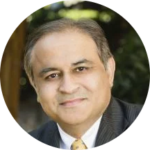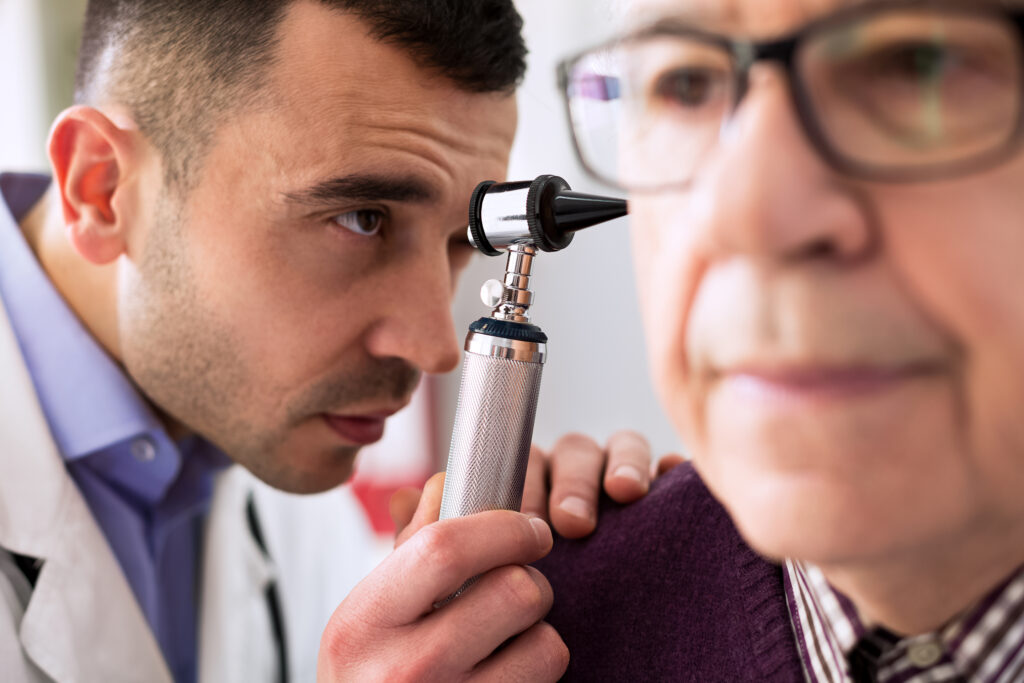This article was originally published by the American Medical Association, and republished with minor edits.
 Ednan Mushtaq, MD, FACS, is board-certified in otolaryngology as well as facial plastic and reconstructive surgery. For nearly 30 years, he has cared for patients at his private practice in McLean, Virginia. Outside of clinic hours, he has published numerous articles, appeared as a radio and television guest, and served as an examiner and committee chairman for the American Board of Facial Plastic and Reconstructive Surgery.
Ednan Mushtaq, MD, FACS, is board-certified in otolaryngology as well as facial plastic and reconstructive surgery. For nearly 30 years, he has cared for patients at his private practice in McLean, Virginia. Outside of clinic hours, he has published numerous articles, appeared as a radio and television guest, and served as an examiner and committee chairman for the American Board of Facial Plastic and Reconstructive Surgery.
What do a typical day and week look like at your practice?
I work Monday through Friday, usually three days in the office and two days in the operating room. My day begins at 7:30 a.m. and I usually finish by 5 p.m. I complete my patient notes in our EHR usually the same day.
On a typical day, I come into the office, answer patient cases for 30 minutes, try to finish up some charts, then see 15 to 22 patients. I do shut down the office at lunch to catch up, make some calls, and do more charting. Sometimes I’ll attend a staff meeting for education or practice improvement. I end the day with more cases and charting, then catching up on emails.
My office is open four days per week for patient care. I don’t see inpatients, so there are no hospital rounds. Fridays I usually spend in meetings and catching up on revenue cycle, accounting, and other small business items, including writing blogs and reading.
Otolaryngology is a diverse field. What services does your practice provide?
Even though it is a surgical subspecialty, we treat many problems that require chronic medical management, such as allergic and nasal disorders. Our practice has four distinct departments: allergy, general otolaryngology, hearing and balance disorders, and aesthetic and skin care.
In the allergy department, patients are skin tested, or laboratory in-vitro tested for inhalant and food allergies.
General otolaryngology patients present with diverse issues, such as nasal and sinus disorders, sleep disorders, voice or swallowing disorders, head and neck cancer or having had thyroid surgery, as well as pediatric problems, such as ear infections and tonsil problems.
Meanwhile, hearing and balance disorders are complex issues that require both medical and surgical management and hearing aid devices.
The aesthetic and skin care department caters to patients who desire enhancement procedures, including:
- Medical-grade skin care regimen
- Injectable fillers and muscle relaxers, such as Botox
- Energy-based procedures, such as radio-frequency micro-needling, lasers, and intense pulsed light
- Advanced aesthetic surgeries, such as rhinoplasty, facelift, eyelid lift, and forehead lift
The reconstructive part of the facial plastic practice involves surgical reconstruction of traumatic and post-cancer treatment defects. Procedures are performed both in the office under local anesthesia or IV sedation and in hospital and outpatient surgery center settings.
What are the most challenging and rewarding aspects of otolaryngology?
The most challenging aspect is providing the highest caliber of care while trying to meet patients’ expectations and navigating the roadblocks presented by insurers and other external forces.
The most rewarding aspect is meeting patients’ medical needs and personal expectations.
What is the impact of burnout on otolaryngology, and how does Privia help reduce physician burnout?
Physician burnout is present in all specialties. I feel otolaryngologists perhaps suffer less burnout than physicians in other specialties because our field is so diverse in both scientific pursuits and lifestyles, which gives our members opportunities to find a good match for them.
Our practice is a member of Privia Medical Group, which is an organization that enables private practices to integrate care between primary care and specialty physicians to bill insurers as one large group. This model helps prevent the burnout that physicians at hospitals and large health groups often face because it enables physicians to have autonomy over their practices while being rewarded by insurers for performing high-quality, value-based care.
How does your lifestyle match — or differ from — what you envisioned?
I’m very fortunate to have had a medical career that has been rewarding on both the professional and personal levels. I knew I was going to be a surgeon before I started medical school. I wanted to work hard, but I also wanted to have a family life. And I feel otolaryngology and facial plastic and reconstructive surgery have allowed me to fulfill my goals.
It differs in that practicing medicine is about a lot more than providing direct patient care. Physicians face many challenges on a daily basis, such as managing staff, working with their EHR, maintaining their medical education and proficiency, risk management related to patient care, and administrative duties, to name a few. Having some knowledge and interest in how to run the business side of your medical practice will help you succeed financially, which will allow you to pursue your professional interests independent of external forces that try to control your practice.
What is one question physicians in training should ask themselves before pursuing otolaryngology?
“What field am I truly passionate about and what kind of lifestyle would I like to have as a practicing physician?”
I feel every medical student should have an opportunity to observe their field of interest in both an academic or large hospital setting and in a private practice office. Unfortunately, medical practices are being bought by hospitals or large healthcare institutions. I feel such consolidation may not be the best setting for all fields of medicine.
Exposing each medical student to different types of practices will help them gather the most comprehensive data to inform their choice.
What books, podcasts, or other resources would you recommend to every medical student interested in otolaryngology?
My advice would be to pursue topics of interest outside of medicine that you may have had prior to medical school or would like to develop. A physician is a lifetime student — I read medical journals on a regular basis and attend my specialty meetings — as well as a teacher who has to educate patients and colleagues.










Related Articles
How to Keep Your Patients From Skipping Mammograms
Kristin Schraa, MD, with Virginia Women’s Center shares how women’s health providers can encourage patients ...
3 Ways Healthcare Can Integrate Behavioral Health and Primary Care
Integrating behavioral health with primary care can lead to better patient outcomes — but how ...
How Can Physicians Support Postpartum Mental Health?
On average, 13 percent of mothers in the United States will develop symptoms of postpartum ...
Engaging Patients in Annual Mammograms
Studies show that a little over 66 percent of women aged 40 and older get ...
What Do Medicare-Aged Patients Want in Their Healthcare?
Within the next 20 years, 20 percent of Americans will be 65 or older. It ...
#TBT: Population Health and Primary Care Providers
In celebration of National Primary Care Week (October 1–5), we are sharing one of our ...